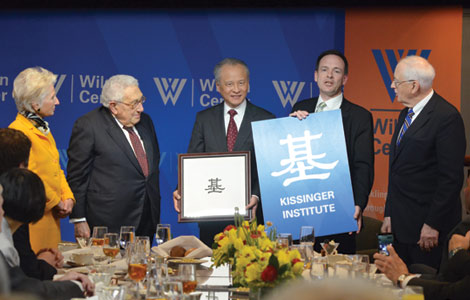China will lead digital revolution: Expert
Updated: 2014-05-01 06:33
By MICHAEL BARRIS in New York (China Daily USA)
|
||||||||
The narrowing of the "digital divide" in China combined with the country's growing engineering-talent pool will push it to the forefront of the digital revolution in the years ahead, according to a panelist at a digital technology conference.
"The sheer manpower" China can bring to digital innovation is "huge", and "extremely important", Paul-Bernhard Kallen, CEO of German media company Hubert Burda Media, said in an interview after a panel discussion at the Digital Life Design conference in Manhattan.
Klaus Hommels, a Swiss venture capitalist also on the panel titled "The Big Picture: The Investment Triangle", said the simultaneous existence of "high-skilled Chinese businesses" such as e-commerce giant Alibaba Holdings Group and dominant US operating system developers such as Microsoft Corp raises questions about the power balance in the digital marketplace.
"How does the power on the digital market shift?" the founder of the Lakestar venture-capital firm asked.
Hommels said Chinese companies such as Sina Weibo, the operator of a Twitter-like social media site that recently listed its shares on the Nasdaq Stock Market in an initial offering that raised $286 million, are "very, very smart". By listing their shares in the US they are able to benefit from a stronger trading infrastructure and valuations that are typically as high or higher than in Hong Kong or the Chinese mainland, he said.
When the panel was asked to predict the source of the next big digital innovation, Hommels said it was impossible to answer that question with certainty. "It's never something you can anticipate," he said.
A recent report by the National Science Board, the policy-making body of the US government's National Science Foundation, suggested that China's proficiency in game-changing science and technology is increasing as US predominance in the field is eroding.
The US's share of global R&D since 2001 dropped to 30 percent from 37 percent, while China's share grew to 15 percent from 4 percent, according to the report. China also tripled its pool of researchers from 1995 to 2008. The report also said 31 percent of undergraduates in China leave with degrees in engineering, compared with just 5 percent of US undergrads.
Joining Hommels and Kallen on the panel were Jeffrey Rosen, a managing director of US investment bank Lazard LLC, and Digital Life Design Chairman Yossi Vardin. The moderator was Henry Blodget, co-founder, CEO and editor-in chief of the Business Insider business and technology news website.
The New York DLD conference, organized by Germany's DLD Media, took its cue from Munich's annual DLD conference, which aims to connect business leaders, technology industry opinion makers and investors.
In addition to the recent Weibo IPO, a conference backdrop was Alibaba's planned New York initial share offering, which some say could be the largest ever. Such moves help these digital technology firms extend their reputation beyond China. While Weibo's Nasdaq listing brought the site prestige due to the Nasdaq's reputation as the high-tech stock market, the filing also was a big boost for the Nasdaq, coming after its reputation-staining Facebook IPO technical glitch.
The cravings of an emerging middle class and young, tech-savvy urban residents for so-called smart technologies have propelled China into second place in the global digital media and technology market, according to statistics provided by digital data research company PQ Media. Despite its cooling economy, China's digital market last year was valued at $173.18, trailing only the US, the firm reported.
PQ Media predicts that despite softer growth, digital media and technology in China will grow to more than $276 billion by 2017, accounting for more than 70 percent of the market's revenue, up from a 48 percent share in 2007.
"As Chinese technology continues to improve and the government consistently upgrades the tech and telecom systems, consumer usage of digital media is expected to climb at a 13.2 percent compound annual growth rate from 2013 through 2017, reaching eight hours on average weekly in 2017," the PQ Media report said.
China still ranks near the bottom among the 15 largest media and tech economies because "over half the nation will lack broadband Internet or smartphone services", the report said.
For the five years ending in 2017, China's growing middle class will drive a 9.1 percent compound annual growth rate increase in traditional media and tech revenue, reaching $16 billion in 2017, according to the report. It predicted that rising consumer spending in China would drive up traditional media usage at 3 percent compound annual growth rate to 41.6 hours weekly by 2017.
China's Lenovo Group led the world personal computer market in the first quarter with a 10.9 percent jump in shipments, according to the Gartner research firm. The company's shipments grew in all regions except Asia-Pacific, where growth in China has been problematic amid the economic slowdown.

 NY real estate firms woo Chinese buyers
NY real estate firms woo Chinese buyers
 China 'to lead' digital revolution
China 'to lead' digital revolution
 Miss CA: Key to success is to 'keep trying'
Miss CA: Key to success is to 'keep trying'
 Chinese tourists get a new map of Boston in Chinese
Chinese tourists get a new map of Boston in Chinese
 Bronx ice-skating rink eyes EB-5 for financing
Bronx ice-skating rink eyes EB-5 for financing
 Kissinger center gets special logo
Kissinger center gets special logo
 Kicking up
Kicking up
 Trade leaders do quick tour of West Coast hubs
Trade leaders do quick tour of West Coast hubs
Most Viewed
Editor's Picks

|

|

|

|

|

|
Today's Top News
China's Xi orders 'crushing blow' to terrorism
Malaysia releases preliminary report on MH370
China, Russia to hold joint military exercise in May
Chinese, Australian PMs discuss MH370 flight
China, Russia to hold joint military exercise in May
US sanctions on Chinese businesses opposed
Bronx ice-skating rink considers EB-5 for financing
3 dead, 79 injured in Xinjiang blast
US Weekly

|

|








